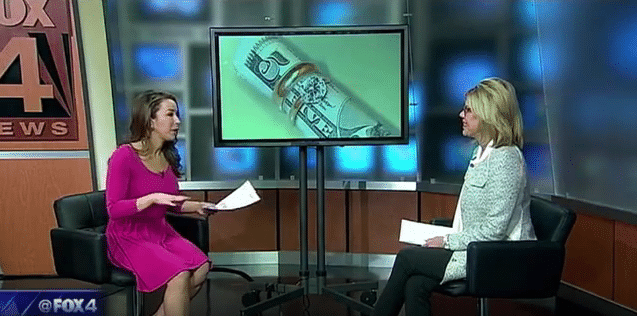Wedding Debt – Don’t Start Off in the Red

So, what do you do if you want that really special occasion, but don’t want to start out the marriage in debt? In this interview, Fox 4’s Jenny Anchondo and financial expert Cathy DeWitt Dunn discuss wedding debt and how to avoid it.
Wedding Debt Interview Transcript
Jenny Anchondo: Well, weddings, of course, can be beautiful, sentimental, and expensive. According to the wedding website, The Knot, the average wedding costs more than $31,000, not including the honeymoon, and nearly half of all couples will spend more than they budgeted for. Ouch. So here to help is financial professional, Cathy Dewitt Dunn. Good morning, Cathy.
Cathy DeWitt Dunn: Good morning.
Jenny: Thirty thousand dollars is more than a lot of people make in an entire year. So now we’re talking about spending that on one day. What should we do if we want to have a really special occasion, but don’t want to start out the marriage in debt?
Cathy: Well, go to the Justice of the Peace. They can marry.
Jenny: I thought you were going to say that.
Cathy: But I think one of the challenges is that 36% of couples that get married end up having a red wedding, which means they went into debt for it, which is just crazy, starting off your relationship in debt. And it’s not the parents paying it. It’s the couples that are paying it. So I think you really need to sit down and look at a budget and know where you’re headed.
Jenny: Right. You know this is very true. I think that the days are over where a parent would pay for an entire wedding or had been saving for an entire life. Now people are paying for it more themselves. So you have to set that budget, and then I guess try to stick to it.
Cathy: Yeah, it’s really hard. You’re getting married, and you know how that is, right?
Jenny: Yes.
Cathy: Little things come up, things that you haven’t expected. So it’s really important to have a budget and stick to it, and make sure, because if you’re going to spend all this money on a wedding, what about your retirement? Are you going to buy a house? Are you going to have any kids? And it’s just crazy that one…
Jenny: Ah-ha!
Cathy: I know. But one in five marriages ends in divorce because of money issues.
Jenny: Yeah, and you do hear so much about the financial arguments. We’re doing that in our premarital counseling right now, going through the money talk and things like that. But what should people do ahead of time to get out ahead of that and prevent the big money arguments during marriage?

Jenny: The other thing that you say to do is disclose baggage. What do you mean by that?
Cathy: Oh, wow. Everybody comes into a relationship with some form of baggage, whether it be credit card debt, student loan debt. You really sit down. Have you been married before? Are you paying child support? These are all things that need to be discussed up front.
Jenny: And is a part of the disclosing baggage if you’ve got a bunch of student loan debt or credit cards or a credit score that needs to be worked on?
Cathy: Exactly. Because one of the things you want to do is empower yourself going forward to have a really good financial future. But it’s full disclosure upfront.
Jenny: Okay. That makes sense. And then setting the ground rules.
Cathy: Yeah. That’s huge. Make sure that you stay within your budget. We do have a situation here where people cheat with financial information. Twenty percent of people may have a private checking account somewhere. So we want to make sure that it’s full disclosure.
Jenny: Yeah. That can’t be good.

Jenny: And finally, ask for help. What do you mean by that?
Cathy: Well, that’s one of the biggest challenges, is if you really can’t sit down with your spouse, maybe you need to go to a financial professional or a marital counselor. Maybe you’ve got somebody in your family that you could really rely on. But it’s okay to ask for help, to have somebody sit down and really help you that has been successful in their marriage.
Jenny: Okay, I’ll get working on that budget. Cathy, thank you so much. On her website she has a lot of different spending tools and things that can help you out. We’ll have that linked up on our website, Fox4news.com.
Disclosure: Links to third-party websites are provided as a convenience. DeWitt & Dunn does not endorse nor support the content of third-party sites. By clicking on a third-party link, you will leave this website where privacy and security policies may differ from those practiced by DeWitt & Dunn.
For informational and educational purposes only. The information contained herein may contain information that is subject to change without notice. Any investments or strategies referenced herein do not take into account the investment objectives, financial situation or particular needs of any specific person. Product suitability must be independently determined for each individual investor.













